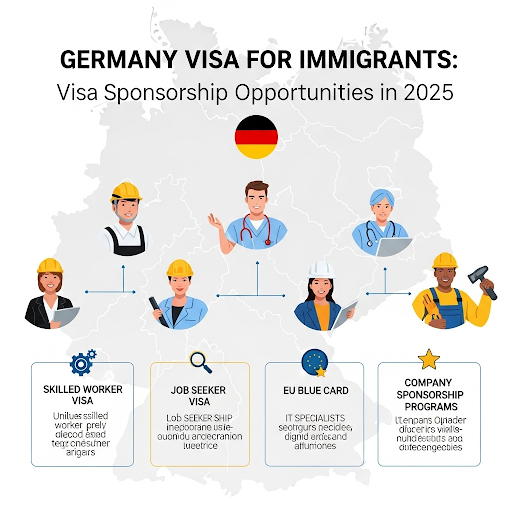Germany is one of the most attractive countries in Europe for foreign professionals looking to build stable careers abroad.
As Europe’s largest economy and a global manufacturing and innovation hub, Germany continues to face a growing labor shortage that has opened thousands of opportunities for foreign workers across various industries.
In 2025 and beyond, the German government is actively working to attract skilled and semi-skilled labor from other countries, offering streamlined immigration processes, legal pathways for permanent settlement, and extensive visa sponsorship opportunities.
For foreigners seeking a better life and a meaningful career, Germany presents a well-structured ecosystem with strong legal protections, competitive salaries, and long-term residency options.
This guide covers the landscape of visa-sponsored employment in Germany, how to apply, which sectors are most in demand, and how to navigate the transition as a foreign worker moving into a new country.
Why Germany Needs Foreign Workers
Germany is experiencing one of the most severe labor shortages in its post-war history. An aging population, low birth rates, and increased demand for digital and technical services have created an urgent need for labor that the local workforce cannot fill alone.
By 2035, Germany is projected to lack up to seven million skilled workers. This gap threatens not only the sustainability of the country’s economy but also the stability of key services like healthcare, construction, and technology infrastructure.
The German government recognizes that immigration is no longer optional—it is a necessity. Therefore, major immigration reforms have been introduced, including the overhaul of the Skilled Immigration Act, a new points-based Opportunity Card for job seekers, and revised salary thresholds for work-related visas.
These reforms are aimed at reducing bureaucracy, increasing the attractiveness of Germany as a destination for international professionals, and integrating workers more efficiently into the labor market.
Understanding Visa Sponsorship in Germany
Visa sponsorship in Germany generally means that an employer is willing to support a foreign candidate in obtaining the necessary work visa to live and work in the country legally.
Sponsorship typically involves the company issuing a formal job offer, verifying the role qualifies under the work visa category, and sometimes liaising with immigration authorities to facilitate the process.
While some countries have a centralized list of employers or roles eligible for sponsorship, Germany’s system is decentralized.
However, specific rules are in place to determine which types of jobs are eligible for foreign applicants, what the salary thresholds are, and what level of qualifications are required.
Key Visa Categories for Sponsored Jobs
Germany offers multiple visa options for foreign workers, depending on qualifications, industry, and the nature of the employment. The most relevant ones for visa sponsorship are outlined below:
EU Blue Card
The EU Blue Card is designed for highly skilled professionals, particularly in sectors experiencing shortages.
It is available to non-EU citizens who hold a university degree and have a job offer that meets a certain salary threshold.
As of 2025, the minimum gross annual salary required is around €43,800, and slightly lower—approximately €39,700—for roles in shortage occupations such as engineers, IT professionals, and doctors.
Benefits of the EU Blue Card include faster access to permanent residency, easier family reunification, and the ability to move to other EU countries after certain conditions are met.
It is one of the most powerful visa types for foreign professionals who want to settle long-term in Europe.
Skilled Worker Visa (Section 18a and 18b Residence Act)
This visa targets individuals with vocational or academic training. Unlike the EU Blue Card, this visa does not require a university degree, provided the applicant has recognized vocational training and a valid job offer in their profession.
The salary must be competitive and meet at least the minimum standards of the sector or be equivalent to collective wage agreements.
Applicants must have their qualifications recognized in Germany, which can take time depending on the profession.
However, the process has become more efficient in recent years, especially for high-demand occupations.
The visa allows for initial stays of up to four years and can lead to permanent residency after five years or sooner in some cases.
Opportunity Card (Chancenkarte)
Introduced as part of Germany’s modernization of its immigration system, the Opportunity Card is a point-based visa allowing foreign nationals to enter Germany to look for a job.
Points are awarded based on education, professional experience, age, language proficiency, and ties to Germany. A minimum of six points is required.
Opportunity Card holders can live in Germany for up to one year to search for a job and can work part-time for up to 20 hours per week.
If they find a job that qualifies for a longer-term visa, such as the Blue Card or Skilled Worker Visa, they can transition to that pathway without leaving the country.
This visa is ideal for those who are qualified but haven’t secured a job offer before arrival.
Job Seeker Visa
The Job Seeker Visa allows individuals with academic or vocational qualifications to stay in Germany for up to six months to search for a job.
Unlike the Opportunity Card, it does not permit part-time work during the search period. However, once a qualifying job offer is secured, the visa can be converted into a full work visa.
Which Sectors Are Sponsoring Foreign Workers in 2025 and 2026
Several sectors are in critical need of foreign talent and are actively offering visa sponsorship. These include:
Information Technology (IT)
Germany’s digital economy is booming. Software developers, IT consultants, cybersecurity analysts, and data scientists are in constant demand.
Many tech companies in Berlin, Munich, Hamburg, and Frankfurt sponsor visas for foreign professionals, particularly for roles involving Java, Python, full-stack development, cloud architecture, and machine learning.
Engineering
Mechanical, electrical, civil, and automotive engineers are highly sought after in Germany. Companies involved in manufacturing, energy, automotive design, and construction regularly offer sponsorship.
Given Germany’s legacy in industrial innovation, engineers find ample opportunities with good salaries, long-term career prospects, and access to world-class facilities.
Healthcare and Nursing
Germany’s healthcare system is under immense pressure due to its aging population. Hospitals, care homes, and rehabilitation centers are sponsoring foreign nurses, elderly care professionals, and physiotherapists.
While proficiency in German (at least B1 level) is often required, the government has introduced fast-track procedures for foreign-trained healthcare workers to get their qualifications recognized and join the workforce.
Skilled Trades and Technical Jobs
Electricians, plumbers, HVAC specialists, welders, machinists, and metalworkers are in high demand, especially in mid-sized companies across Germany.
These roles do not require university degrees but do require certified vocational training and relevant work experience. Many of these jobs come with structured training programs and clear advancement pathways.
Hospitality and Tourism
Hotels, restaurants, and tourism-related businesses are struggling to fill positions after the post-pandemic recovery.
Cooks, waiters, hotel receptionists, and housekeeping staff are often recruited from abroad, especially for seasonal or long-term roles in popular tourist regions. While language skills help, some positions are open to English-speaking candidates.
Logistics and Transportation
The rise of e-commerce and global supply chain demands has created a growing need for warehouse workers, logistics managers, forklift operators, and drivers.
These roles often come with stable contracts and good working conditions. In many cases, visa sponsorship is available, particularly if the worker has a proven track record and necessary certifications.
Education and Childcare
Teachers, especially for English, mathematics, and science, are needed at international schools and bilingual institutions.
Early childhood educators are also in demand, and while these roles often require formal teaching credentials, some institutions offer on-the-job training for foreigners with relevant backgrounds.
Agriculture and Seasonal Work
Germany’s farming and horticulture sectors rely on seasonal labor. While many roles are filled through EU seasonal programs, farms are increasingly looking to sponsor non-EU workers for repeated seasonal contracts, especially in fruit and vegetable harvesting, greenhouse work, and animal care.
How to Apply for a Sponsored Job in Germany
Successfully securing a job with visa sponsorship in Germany requires preparation and strategic planning. Here are the steps applicants should take:
1. Prepare a Germany-Compatible CV
Your resume should follow a clear, concise format with sections on personal data, work experience, education, skills, and certifications.
Unlike in some countries, including a professional photo and date of birth is customary in Germany. It’s also advisable to include references or letters of recommendation.
2. Write a Targeted Cover Letter
A cover letter should be tailored to each employer and explain why you are applying, what qualifications you bring, and your willingness to relocate.
Mention explicitly that you require visa sponsorship and that you meet the requirements for German work visas.
3. Search on Job Platforms
Use major German job platforms like StepStone, Indeed Germany, Jobbörse (Federal Employment Agency), and English-speaking job boards. Filter for “visa sponsorship” or roles that accept “international applicants.” Many tech and engineering roles will state upfront if sponsorship is available.
4. Apply Directly to Employers Known for Sponsoring
Many multinational corporations and mid-sized German companies are known to sponsor visas. Look for openings at companies such as SAP, Siemens, Volkswagen, Bosch, and international startups based in Berlin. Industry-specific job fairs and recruiting agencies can also help identify sponsor-ready roles.
5. Prepare for Interviews and Assessments
Interviews often include multiple rounds: HR screening, technical assessments, and cultural fit interviews. Be ready to discuss your technical skills, explain your qualifications in detail, and answer questions about relocation and visa processes. For many roles, especially in healthcare or trades, proof of language proficiency will be assessed.
6. Gather Documents for Visa Application
After receiving a job offer, the next step is to apply for the appropriate visa at your local German embassy or consulate. You will need:
- A valid passport
- Signed job contract
- Proof of qualifications and their recognition in Germany
- Proof of health insurance
- Proof of accommodation in Germany
- Completed visa application forms
- Passport-sized photos
- Visa fee payment receipt
7. Register in Germany and Begin Work
Once you arrive in Germany, you must register your residence (Anmeldung) within 14 days. After registration, you can activate your health insurance, open a bank account, and begin work as soon as your residence permit is approved.
Living and Working Conditions in Germany
Germany offers one of the highest standards of living in Europe. Foreign workers benefit from strong legal protections, social welfare, health insurance, and structured labor rights. Average work hours are reasonable, with generous vacation time, and work-life balance is a cultural norm.
The cost of living varies by city. Berlin, Leipzig, and Dresden are relatively affordable, while Munich and Hamburg are more expensive. Public transportation is efficient, and healthcare is among the best in the world. German workplaces value punctuality, precision, and professional integrity, so adapting to these norms is important for long-term success.
Permanent Residency and Citizenship Options
Foreign workers who have lived and worked in Germany for a certain period may apply for permanent residency. EU Blue Card holders can apply after 21 months if they speak B1-level German or after 33 months without language proficiency. Skilled Worker Visa holders typically become eligible after five years.
German citizenship is also an option. As of recent reforms, dual citizenship is increasingly accepted, and foreigners can apply after five years of legal residence in Germany, provided they meet integration and language requirements.
Addressing Common Concerns & Frequently Asked Questions
Do I need German language skills?
Not for tech roles—many employers operate in English. Healthcare, hospitality, and public sectors, however, usually require B1–B2 German proficiency.
Which is the best visa route?
For degree holders, the EU Blue Card is optimal. If you are vocationally trained or in shortage trades, the Skilled Worker Visa suits better. The Opportunity Card is ideal if you’re job hunting without a job offer.
Can I bring my family?
Yes—spouses and children often receive accompanying rights. Spouses can start work immediately under Blue Card conditions.
What about qualification recognition?
Use the “Anerkennung in Deutschland” portal to assess recognition requirements. Some regulated professions require formal state approval and licensing.
Can I change jobs casually?
Yes, especially under the Blue Card—in-country changes are allowed after notifying the immigration office. Skilled Worker requires Federal Employment Agency approval for changes.
Final Thoughts
Germany’s labor shortage is a long-term structural issue, not a temporary challenge. For foreigners with the right skills, qualifications, and willingness to adapt, the opportunities are vast and growing.
With reforms making the immigration system more efficient and transparent, 2025 and 2026 represent ideal years for international professionals to consider relocating to Germany.
Whether you are a seasoned engineer, a newly graduated developer, a trained nurse, or a skilled technician, Germany has space for your talent—and is ready to support your journey.






